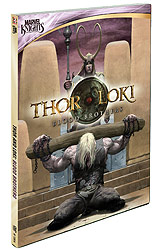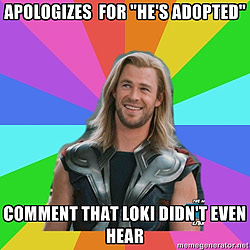Thor and Loki: Blood Brothers
Published on August 9th, 2012 in: Comics, DVD, Movie Reviews, Movies, Reviews |
I have a confession to make: Until the movie Thor came out last summer, I didn’t know that Marvel comics had characters based (somewhat loosely) on Norse mythology. Like many people, I enjoyed Chris Hemsworth’s endearing portrayal of Thor, god of thunder, and Tom Hiddleston’s mesmerizing take on Thor’s brother Loki, the god of mischief. Their painful family history also added a layer of complexity to this summer’s Avengers, even if Loki was far less sympathetic the second time around.
Recently, I had the opportunity to see another interpretation of these characters. I watched Thor and Loki: Blood Brothers, a four-episode motion comic from Marvel Knights Animation. (For those who may not know, a motion comic is a slightly different style of animation, where the background is more static and the movements are less fluid.) It’s based on a 2004 storyline with no connection to the Marvel films.
As the story begins, Loki has gained control of Asgard, the home of the gods. (In Marvel’s version of the myths, this is on another planet.) Thor is chained in one of the dungeons, and Odin, too, is Loki’s captive—in fact, most of the court is either in chains or under house arrest. The people who helped Loki take power are coming to call in the favors he owed him, but Loki puts them off, instead continuing to wallow in how badly he was treated as an adopted child growing up in Odin’s court.
One of Loki’s most insistent petitioners is Hela, goddess of death. (Interestingly, Hela is Loki’s daughter in mythology and in some Marvel stories, but not in this one.) She’s convinced that Loki will look weak unless he executes his brother. Loki initially resists this idea angrily; he grew up in Thor’s shadow, but Thor always showed him more affection and respect than anyone else did. Then the god Balder tells Loki that during the period when died, he saw a multitude of parallel universes. In these alternate possibilities, Loki’s life took many different paths, but always ended up with him defeated and imprisoned under a venomous serpent.
The sorceress Karnilla, another ally of Loki’s, casts a spell that confirms Balder’s vision. Loki becomes certain that executing Thor is the only way to avoid a horrible fate. He had earlier gotten Odin to admit that he deliberately raised Loki and Thor as counterpoints to each other, providing the court with a despised outsider to increase Thor’s glory. He resolves to have Thor executed by beheading, and to destroy the Rainbow Bridge (which connects Asgard to the other Nine Worlds) at the same time. Loki continues to wrestle with this decision, however. A surprise visitor from his past finally comes along and changes the game.
The main complaint that I have with Thor and Loki is that the title is misleading, as Thor stays locked away until the very end. Until then, the only interaction between the two comes in brief flashbacks. With the interesting dynamic between this characters, this feels like a missed opportunity. In the absence of Thor, there’s no one to really like. The motion comic does as well as the movies, if not better, at establishing Loki’s mistreatment, but not as good a job establishing that Thor cares about him.

From Overly Accepting Thor Tumblr
There were definitely things I liked about it. The artwork was beautiful in places, even though not everyone may enjoy the motion comic format. The dialogue was written in a antiquated style that had an almost Shakespearean ring to it, while being easier to understand. (The word “galvanize” did stick out for me, though—that’s a specific historical reference that probably wouldn’t be made in Asgard.) Most of all, though, I enjoyed the big concepts that it played with, such as the parallel universes, destiny, and the balance between opposites.
The story ends on a down note, after very little actual action. Thor doesn’t die, but neither are he and Loki reconciled. In fact, Loki’s most important decision seems to hinge on his realization that he’s all alone and doesn’t fit in anywhere. It’s left ambiguous as to whether he finally manages to dodge his snakey fate, but if he does, it’s not in the way he intended.
Thor and Loki: Blood Brothers was released in April of 2011, before Thor came to theaters. If you’re looking for animated backstory for the Marvel movies, however, this is not the place; not only is the story not connected, but these are not animated versions of Hiddleston and Hemsworth. If the characters interest you and you’re curious about another interpretation, Blood Brothers is probably worth your time; but the live action movies are more satisfying on a couple of levels.
Time limit is exhausted. Please reload the CAPTCHA.